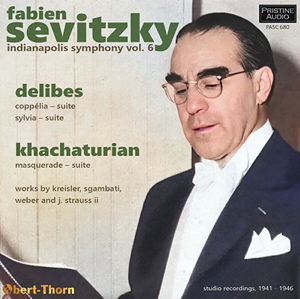
Fabien Sevitzky (conductor)
The Indianapolis Symphony – Volume 6
rec. 1941-1953
Pristine Audio PASC680 [71]
This is the sixth and final volume in the Fabien Sevitzky-Indianapolis Symphony series. It has restored a body of recordings that’s long been overlooked and in the case of Volume 6 producer Mark Obert-Thorn tells us that none of the pieces has ever received an official CD release before.
The disc’s theme is the dance and of terpsichorean pleasures there is no shortage. The first four pieces were never actually transferred to LP and haven’t even managed an ‘unofficial’ CD release. Sevitzky orchestrated Kreisler’s Praeludium and Allegro, recording it in January1942. It’s quite a discreet piece of work, lightly done, ensuring that for the most part the ensemble string line doesn’t swamp Kreisler’s invention under a mass of florid writing or, indeed, to soup it up. Sevitzky does introduce a solo violin later as the showpiece-virtuoso passage arrives, but it’s done very musically. Sgambati’s Vecchio Minuetto was originally written for solo piano in 1885 and Arcady Dubensky’s orchestration celebrates and amplifies its sense of nostalgia. Even more charming, though, is Dubensky’s orchestration of Weber’s Waltz No.5 from Favoritenwalzer, another piano original, this time in B flat, that receives the full Dubensky naughty lilt treatment. Strauss’ Voices of Spring was the only Strauss Waltz that Sevitzky recorded but he proves an adept, though it’s true that, as Obert-Thorn notes, he has to speed up toward the end to fit the music onto a single side.
In March 1946 Sevitzky recorded two Delibes’ suites. Coppélia included the Thème slave varié, Danse fête, Valse des heures, Nocturne, Danse des automates et Valse, and Czardas. Sylvia included the Prélude et Les Chasseresses, Intermezzo et Valse lente, Pizzicati and Cortège de Bacchus. Coppélia has coquettish charm and elegance but it had the misfortune to be recorded and issued at around the same time as Constant Lambert recorded his selection and whilst this undoubtedly didn’t affect American sales much, Lambert was a natural ballet conductor and with the forces of the Royal Opera House orchestra, even in the immediate post-war period when all British orchestras were struggling to retrench, Lambert is the more subtle, scrupulous and airborne interpreter. Barbirolli and the Hallé were competitors in the case of Sylvia, recorded in 1948, and are rather more exuberant performers, though here things are rather more even (and Barbirolli and/or HMV cut the Prelude). Where Sevitzky scores is in the excellence of Victor’s recording. The final piece is Khachaturian’s suite from Masquerade – Waltz, Nocturne, Mazurka, Romance and Galop – sourced from a Capitol LP recorded in January 1953. Sevitzky omits the brief introduction to the suite and he and the orchestra turn in a spirited reading, again well recorded, with a wind-flecked Nocturne and a fiery Galop, though it’s not preferable to Efrem Kurtz’s contemporaneous recording.
This has been an invigorating and revealing sequence of discs, which has shown how recording flourished beyond the Big Five and how standards in American orchestral playing emerged unscathed by the predations of the war. Obert-Thorn’s restorations are praiseworthy, and the series has been a real success.
Jonathan Woolf
Availability: Pristine AudioContents
Fritz Kreisler (1875-1962)
Praeludium and Allegro (in the Style of Pugnani) (orch. Sevitzky)
Giovanni Sgambati (1841-1914)
Vecchio Minuetto (1885, orch. Dubensky)
Carl Maria von Weber (1786-1826)
Waltz (No. 5 from Favoritenwalzer, orch. Dubensky)
Johann Strauss II (1825-1899)
Voices of Spring (Frühlingsstimmen) – Waltz, Op. 410 (1883)
Léo Delibes (1836-1891)
Coppélia – Suite (1870)
Sylvia – Suite (1876)
Aram Khachaturian (1903-1978)
Masquerade – Suite (1944)


















